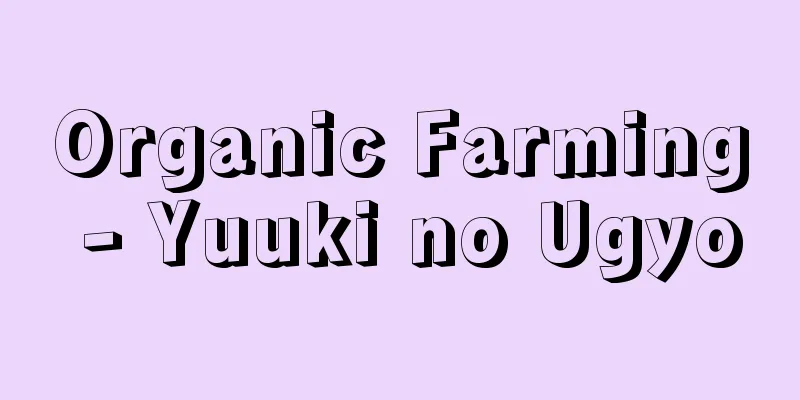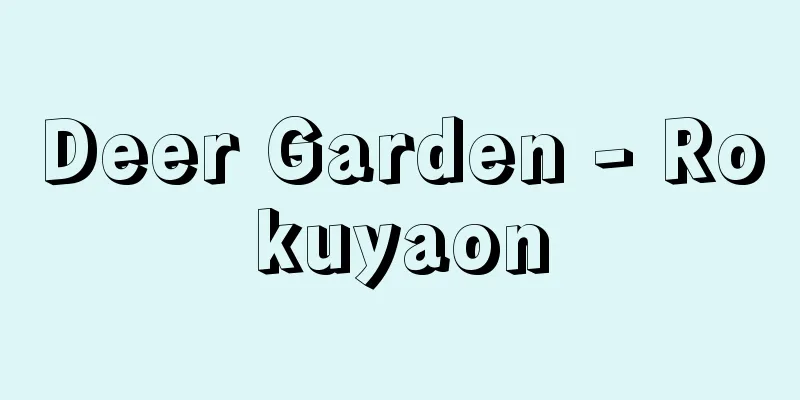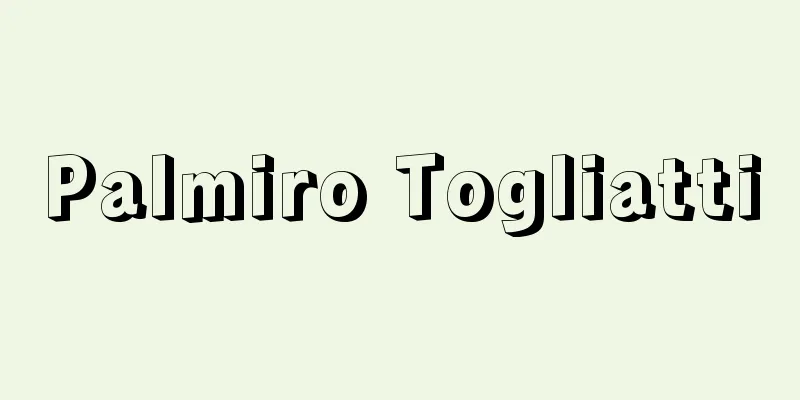Organic Farming - Yuuki no Ugyo

|
It is the Japanese translation of the American term "organic farming," and became widely known through the activities of the Japan Organic Agriculture Research Association, which was established in 1971 (Showa 46). In Western countries, it is called biological agriculture or ecological agriculture. In Japan, it is also called organic farming. Organic farming was born as a criticism of modern chemical agriculture, which is based on the use of chemical fertilizers, pesticides, and other chemical substances. Its general characteristics are that it aims to make chemical fertilizers and pesticides unnecessary by improving soil fertility with organic fertilizers such as compost and manure, and by cultivating healthy crops that are resistant to pests and diseases. However, alternatives to pesticides are still in the trial and error stage. For example, instead of using herbicides, weeds can be killed using shrimp, ducks, carp, and crucian carp, or weeds can be suppressed by covering them with straw mulch or waste paper. As alternatives to insecticides and disinfectants, attempts have been made to use charcoal, bamboo charcoal and its vinegar, and natural enemies, but these are still in the development stage. Nevertheless, organic farming is steadily achieving results by cultivating the fertility of farmland while paying attention to the circulation of organic matter and bioenergy within the farm, and by promoting the growth of healthy crops through proper crop rotation, multi-crop cultivation, and biological control, aiming to produce safe, tasty agricultural products in harmony with the natural environment. Natural farming is similar to organic farming, but it is basically the same as organic farming in that it respects ecosystems and life systems, rejects the chemicalization of agriculture, and places importance on soil development. Organic farming is no longer merely a method of farming; it has begun to take on the characteristics of a social movement. It is attracting attention as a movement to create a new culture, with ideas such as a review of eating habits rooted in the local climate (the idea of Shindo Fuji), a movement for local self-sufficiency in food, collaboration between producers and consumers over the distribution of organic agricultural products (production-consumption collaboration), cooperation and integration between rural and urban areas, active involvement in environmental and energy issues, and a shift in the value system of industrialized society. The Japanese Society for Organic Agriculture was established in 1999, and scientific results related to organic farming are expected to emerge. In general, organic farming is labor-intensive and has limitations on its scale, making it difficult to reduce costs compared to modern chemical farming. As a result, the price of organic produce is relatively high. Nevertheless, consumers who are concerned about dioxins, environmental hormones, genetically modified foods, and other issues are increasing their demand for organic foods year by year. This led to a need to guarantee quality systematically, and so in June 2000 the Revised JAS Act (Revised Agricultural and Forestry Standards and Quality Labelling Act, officially the Act Partially Amending the Act on Standardisation and Proper Labelling of Agricultural and Forestry Products) came into force, launching an inspection and certification system for organic food. This brought organic food quality standards to levels comparable to those in Europe and the US, making it easier for consumers to make choices. However, for producers, many problems are expected, including higher costs resulting from the need to meet strict quality standards, the impact on direct sales, and competition with imported foods. [Keiichi Sakamoto] [Reference] | |Source: Shogakukan Encyclopedia Nipponica About Encyclopedia Nipponica Information | Legend |
|
アメリカで行われているorganic farmingを日本語化したもので、1971年(昭和46)に発足した日本有機農業研究会の活動によって広く知られるようになった。西欧諸国では生物農業または生態系農業とよばれている。日本ではオーガニック農業ともよばれている。有機農業は、化学肥料・農薬などの化学物質の使用を前提とする現代の化学農業への批判として生まれた。その一般的特色は、堆肥(たいひ)や厩肥(きゅうひ)などの有機質肥料によって地力を高め、病虫害に強い健康な作物を育てて、化学肥料や農薬を無用化しようとするところにある。 ただし、農薬にかわる方法については、なお試行錯誤の段階にある。たとえば除草剤のかわりにカブトエビ、アイガモ、コイ、フナなどで除草したり、敷き藁(わら)や古紙などの被覆で雑草を押さえる方法などがある。殺虫剤、消毒剤にかわる防除技術としては、木炭、竹炭とその酢液の利用、天敵利用などが試みられているが、なお開発途上の段階にある。とはいえ、有機農業は、有機質や生物エネルギーの農場内循環に留意しながら農地の地力を養い、さらに適正な輪作、多品目栽培、生物学的防除などによって健康な作物の生育を図り、自然環境と調和した安全で味のよい農産物の生産を目ざして着実な成果をあげている。有機農業と類似のものに自然農法があるが、生態系や生命系を尊重し、農業の化学化を拒否して土づくりを重視する点では有機農業と基本的に同じである。 有機農業はまた、単に一つの農法であるにとどまらず、一種の社会運動的な色彩を帯びるようになってきている。すなわち、風土に根ざした食生活の見直し(身土不二(しんどふじ)の思想)、食糧の地域内自給の運動、有機農産物の流通をめぐる生産者と消費者の提携(産消提携)、農村と都市との協力・結合、環境・エネルギー問題への積極的関与、工業化社会の価値体系の転換など、新しい文化の創造運動としても注目を浴びている。1999年(平成11)には日本有機農業学会が設立され、有機農業に関する科学的成果が期待されている。 一般に有機農業は手間がかかり、規模拡大に限界があるために現代化学農業に比べてコスト節減が困難である。そのため有機農産物の価格は割高である。それにもかかわらず、ダイオキシン、環境ホルモン、遺伝子組換え食品などに不安をいだく消費者は、有機食品(オーガニックフーズ)への需要を年々高めている。 そこからその品質を制度的に保証する必要が生じ、2000年6月に改正JAS法(「改正農林規格・品質表示法」。正式には「農林物資の規格化及び品質表示の適正化に関する法律の一部を改正する法律」)が施行され、有機食品の検査・認証制度が発足した。有機食品の品質基準はこれによって欧米なみに適正化され、消費者の選択に便宜を与えることになった。しかし、生産者にとっては、厳しい品質基準をクリアする必要から生じるコスト高のほかに産直に与える影響や輸入食品との競争など、多くの問題が予想される。 [坂本慶一] [参照項目] | |出典 小学館 日本大百科全書(ニッポニカ)日本大百科全書(ニッポニカ)について 情報 | 凡例 |
<<: Organic Semiconductors - Yuuki Handoutai
>>: Torajyu Yuki - Yuuki Torajyu
Recommend
Unpaired electron - Unpaired electron
This refers to electrons that are not paired with...
Beating
A type of cooking method in Japanese cuisine, and ...
Dragonfly - Dragonfly
A general term for insects belonging to the order ...
Red Tent
The nickname of the Japanese theater company, Situ...
Chamaesaura
…The plate lizard genus Gerrhosaurus is a lizard-...
Ishizaki ruins
…Rice cultivation is thriving in the alluvial pla...
Theater group circle
A Japanese theater company. Its representative is ...
Purification garment - Jyoe
〘Noun〙 ("e" is the Go-on pronunciation o...
Chief of the clan - Uji no Osa
...the head of a clan in ancient Japan. Also call...
Accounting - Kaikei (English spelling) accounting
It refers to a system or act of recording, calcul...
Argentine tango (English spelling)
Tango created by Argentine and Uruguayan composer...
Youngstown - Youngstown
A city in northeastern Ohio, USA. Located near th...
Trabeculae of the external ear
…The eardrum is thought to be a membrane of skin ...
Corregidor (English spelling)
Local administrators in Spain and Spanish American...
Korea Shokusan Bank
A special bank established in 1918 by decree of th...


![Rusutsu [village] - Rusutsu](/upload/images/67cd3070e48f3.webp)






